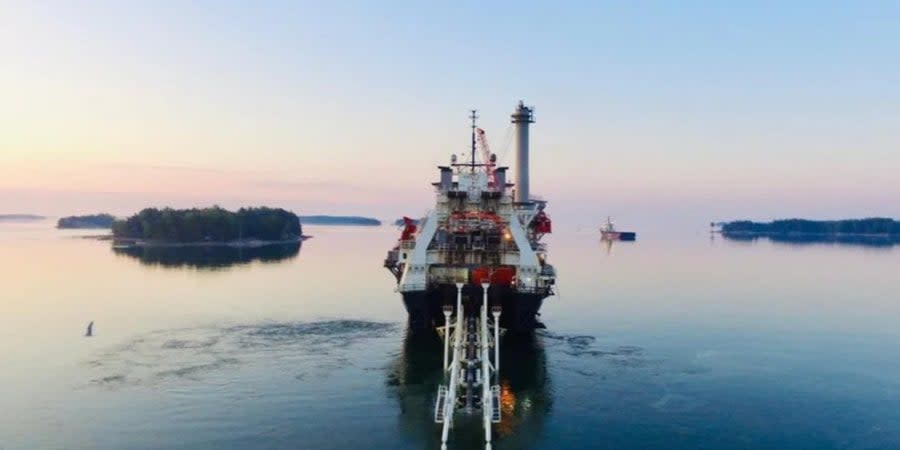Infrastructure sabotage in Europe: Russia suspected but not openly blamed

European law enforcement is increasingly detecting Russian involvement in sabotage incidents targeting strategic infrastructure, yet there is a reluctance to formally accuse Moscow, according to a Wall Street Journal analysis published on May 20.
"Alleged hybrid assault is a challenge to European democracies that have a high bar for evidence of culpability," the WSJ explains.
Read also: Prague puts GRU general on wanted list
Reacting to hidden threats is difficult because evidence of suspected attacks — including a severed undersea gas pipeline, outages in vital internet connections, and rail disruptions — is often inconclusive. Potential culprits in important cases often include commercial shipping or fishing vessels engaged in apparently legitimate maritime transport or fishing near sensitive seabed facilities that were destroyed around the same time. They rarely have direct ties with the Russian authorities, investigators said.
European governments have indicted some Russians and Russian proxies in smaller incidents and have become more vocal in blaming Moscow of waging hybrid warfare — but so far have not accused it in specific attacks. The lack of clear evidence prompts officials to leave the most brazen cases open or declare investigations inconclusive.
Finnish investigators linked a Chinese-registered vessel manned by a Russian crew, to the cutting of the Balticconnector natural-gas pipeline connecting mainland Europe with Russia last fall, article authors reminded. As the investigation progressed and the ship made its way around Scandinavia back to Russia, the Finns contacted their Norwegian counterparts and told them of their suspicions. Norwegian authorities considered forcing the ship into one of its ports for inspection, but ultimately decided they lacked clear evidence. A Norwegian Coast Guard vessel followed the New Polar Bear as it was passing sensitive maritime infrastructure.
"Only a week or two later we would have had enough evidence to stop and search the ship, but by then it was already too late," the WSJ quoted an unnamed Norwegian official as saying.
Identifying potential attacks is becoming increasingly difficult as Russia now frequently uses civilian and commercial vessels to survey and potentially attack critical infrastructure — undersea connections, offshore energy facilities, transportation networks, and military facilities, the people familiar with these cases told reporters.
Some governments also refrain from making accusations against Moscow because they fear an escalation of "tensions beyond control". The attacks often do not qualify as military acts of aggression because they involve civilian vessels, their operators are willing to talk with the investigators, and claim their innocence.
Investigators and prosecutors must meet European justice systems high bar for criminal evidence, while authorities grapple with enforcing national security laws against would-be criminals benefiting from freedoms guaranteed by Western democracies.
European governments have put critical infrastructure protection systems on high alert in an attempt to prevent attacks, increased the number of security personnel, and installed more cameras and sensors at railway and maritime facilities, the WSJ wrote.
German prosecutors last month detained two dual Russian-German nationals, suspected of spying for Moscow with the aim to disrupt Western military aid to Ukraine through sabotage. Germany's population includes a Russian community of nearly four million — Moscow's spies are targeting to recruit them, security officials said.
Ordinary civilians are being recruited through social networks — particularly Telegram — as well as through chat rooms in popular online games, investigators said. Recruits sometimes do not even suspect that they are acting on behalf of Russia.
Polish authorities in February detained a man who worked for Russian intelligence and, they said, was planning to commit sabotage, including setting fire to facilities in Wroclaw, a major supply hub to Ukraine. A Polish court sentenced six men to prison on charges of espionage late last year, article’s authors wrote.
One of Moscow's goals is to spread fear and distrust through sabotage, some officials believe – in their opinion, keeping quiet about these incidents is a more prudent approach than making accusations against Russia, and therefore spreading fear. This approach has drawn criticism, the WSJ noted.
“If the current strategy is in fact to avoid attribution in cases where significant evidence points to Russia,” said Benjamin L. Schmitt, a senior fellow at the University of Pennsylvania who specializes in European energy security, “this will only degrade deterrence and invite further attacks against critical infrastructure.”
More and more governments are issuing public warnings.
Norway's security agency plans to publish an important report on Tuesday — it is expected to analyze the threat of Russian sabotage in the country.
Britain's cyber intelligence agency GCHQ is "increasingly concerned about growing links between Russian intelligence services and proxy groups to carry out cyberattacks, as well as suspected physical surveillance and sabotage operations," the agency's director, Anne Keast-Butler, said last week.
NATO issued an "exceptionally blunt" statement this month accusing Russia of "stepping up its campaign of sabotage, acts of violence, cyber and electronic interference, disinformation campaigns, and other hybrid operations."
Moscow uses civilian equipment for espionage and sabotage, authorities believe. Russia has been using its huge commercial fishing fleet recently, as well as naval research vessels to gather intelligence in the Arctic, an area, crucial to its nuclear-submarines strategic deterrence, Norway's PST security service spokesperson said. Some of these ships are modern, more than 300-ft long vessels equipped with sonar and other technologies that allow them to scan the seabed, the official said.
These vessels have mapped critical underwater infrastructure around Europe and identified potential targets in the event of a full-scale confrontation with NATO since the start of the full-scale invasion of Ukraine, the WSJ quoted officials as saying. US officials see similar threats to subsea cables in the Pacific Ocean.
We’re bringing the voice of Ukraine to the world. Support us with a one-time donation, or become a Patron!
Read the original article on The New Voice of Ukraine

